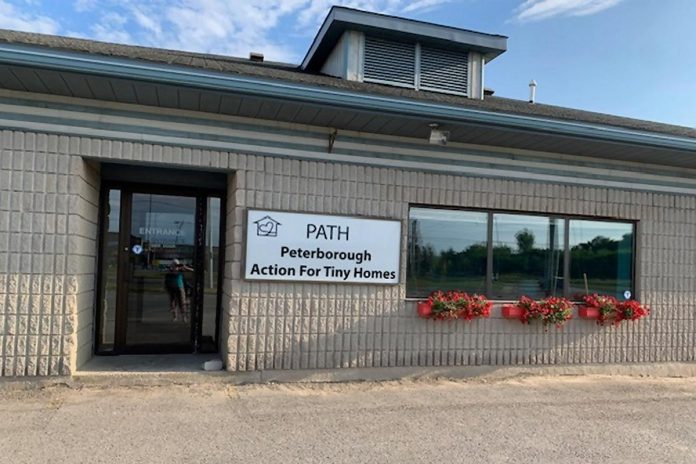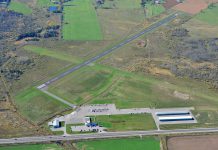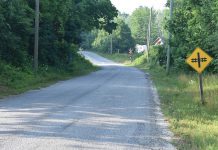
Peterborough Action for Tiny Homes (PATH) is back at square one … again.
Peterborough city council, meeting as general committee on Monday night (August 26), voted 8-2 against approving a temporary use by-law that would have permitted the community-funded grassroots organization to build 24 sleeping cabins for people experiencing homelessness at 385 Lansdowne Street — the former Peterborough Humane Society property located east of Ashburnham Drive.
Although a city staff report had recommended that council approve the application for a temporary use by-law, as it conformed with land use planning requirements, Monday night’s meeting became a referendum on the viability of PATH’s proposal itself, as well as the suitability of the proposed site, with council hearing from 10 delegations that included neighbouring businesses and residents who objected to the location of the proposed sleeping cabin community.
While PATH could appeal council’s decision to the Ontario Land Tribunal, this would be a potentially costly and lengthy process for the non-profit organization that may not be successful, leaving PATH with no option except to find an alternative site.
This is not the first time council has rejected a temporary use by-law for PATH — it also did so during the inaugural general committee meeting of the then-new city council on December 5, 2022.
At that meeting, councillor Alex Bierk had put forward a motion to support a PATH project to build 15 sleeping cabins at 845 Park Street to address the city’s homelessness crisis over the winter. Bierk’s motion had called for a temporary use by-law and a potential site plan exemption application to allow the cabins to proceed, as well as the city providing the organization with $100,000 in start-up funding.
Council had voted 8-3 against councillor Bierk’s motion, with several councillors pointing out that PATH had not followed the required planning process for land use approval.
“The idea has been started, but for the idea to become a reality must follow the rigours of the planning approval process — and that has not yet started — whether it’s a temporary use by-law, whether it’s a zoning by-law amendment,” councillor Kevin Duguay, who was a land use planner for the City of Peterborough for more than 15 years, said at the time.
“One of the things that we have to avoid in public policy is moving in a direction where there may be a failure,” Mayor Jeff Leal said during that same meeting, where he referred to sleeping cabin projects in other communities. “We should take the time. I’m told in these other communities it was eight or nine months of detailed planning before they established their sleeping cabins in these respective communities … It really behooves us to take the time to get this right so it will be a successful initiative down the road.”
Three months later, in March 2023, PATH entered into a three-year lease agreement with Habitat for Humanity Peterborough and Kawartha Region for the purpose of providing transitional shelter support at the Lansdowne Street site, which Habitat had purchased with the intention of later developing multi-unit affordable residential housing. PATH then began the land use planning process that would eventually result in an application for a temporary use by-law for the site, which is currently zoned as commercial.
At Monday night’s general committee meeting, council heard a presentation from city planner Christie Gilbertson on the application for the temporary use by-law for 385 Lansdowne Street.
During the presentation, councillor Kevin Duguay asked Gilbertson to confirm that PATH had already begun work on the site in advance of the approval of the application, and Gilbertson confirmed some work had been done “at PATH’s risk” to address grading and drainage issues.
After the presentation, council heard from 10 registered delegations about the temporary use by-law application. With the exception of delegates from PATH, its agent EcoVue Consulting Services, and the Elizabeth Fry Society, which was been hired by PATH to provide wrap-around services at the site, all the delegations opposed the application.
Toromont Industries, a heavy machinery company that operates Toromont Cat and Battlefield Equipment Rentals to the south of 385 Lansdowne Street, expressed concern about the location of the sleeping cabin community in close proximity to their operations in an industrial zone.
“That heavy machinery makes a lot of noise (and) spits out a lot of dust and emissions,” said Garnet Peirson, the company’s vice president of real estate and development. “If there are complaints to Ministry of the Environment about noise, Ministry of the Environment can come in and shut down our operations or they can severely alter our operations.”
Peirson said this is something the company has faced in Kanata when a residential development was located near their business as well as in Concord. Peirson also noted that Toromont is planning to expand directly behind 385 Lansdowne Street.
Council also heard from Noah Gordon, a lawyer with Miller Thomson LLP representing the owner of Willowcreek Centre, which is located directly across from 385 Lansdowne Street and includes a restaurant, grocery store, liquor store, and dollar store.
Gordon expressed his client’s opposition to the temporary use by-law, primarily that the intended use for temporary residential dwellings was incompatible with existing use and that there are safety issues with the site’s location along a busy four-lane highway not addressed in a traffic study.
“The nearest crosswalk to the west is about 600 metres away and the nearest to the east is about 150 metres away,” Gordon said. “It is no doubt that residents would often choose the convenience of jaywalking unsafely across Lansdowne to the popular destinations at Willowcreek like McDonalds, Dollarama, and the LCBO.”
Although it had no bearing on the impact of the location to his client, Gordon also questioned the financial viability of the proposed PATH program, referencing the costs of the City of Peterborough’s bridge modular housing program on Wolfe Street and noting that similar tiny home projects in other communities have failed.
Council then heard from veterinarian Dr. Joe Muise, owner of Peterborough Pet Hospital, which is located directly to the west of 385 Lansdowne Street. His major concern was about the security of his business and the safety of clients and staff given that the veterinary clinic stocks controlled drugs including powerful pain medication.
“My hospital is like a candy store for people who are desiring drug use,” Muise said, later telling council that he has invested around $18,000 in improving security at the clinic.
Councillors heard from a resident who lives on Farmcrest Avenue, north of Farmcrest Park on the north side of Willowcreek Centre, who said she has already experienced issues with tenting, drug use, and bad behaviour in Farmcrest Park over the past number of years and is concerned about the safety of her children and others in the community.
“I don’t want this in our backyard,” she said, before referring to NIMBY (“not in my backyard”). “This is a term that has been used by a lot of people, shaming us, making us afraid to speak out … I’m not afraid to tell you, I don’t want this in my backyard.”
Keith Dalton with PATH then addressed council about the project, noting that the organization is not asking for any city funding to operate the sleeping cabin community as it has raised sufficient funds to operate the first year of a three-year program.
“Council has many financial responsibilities around housing,” Dalton said. “The city budget is already stretched to meet its commitments. That is why PATH will operate entirely on funding from charitable and non-municipal sources.”
“As we move forward toward implementation, we are grateful for the stewardship of Debbie Carriere of the Elizabeth Fry Society, who will ensure that we operate a safe and inclusive housing facility, building upon the experience of operating the (City of Peterborough’s) bridge program,” Dalton said. “PATH will be able to offer stable housing support and training to 24 currently unhoused persons in a safe facility, with a private cabin, washrooms, showers, laundry, a commercial kitchen, dining, and community space.”
“Our main admission criteria will be agreeing to changes that move toward permanent housing and a desire to live together in a peaceful, supportive community. Our programs will provide a sense of purpose, responsibility, and an optimistic vision for the future, under the experienced guidance of our Elizabeth Fry site manager who will work collaboratively with fire services, police services, and medical professionals to build a positive relationship with our residents and all our neighbours.”
Dalton said PATH would take a “gradual approach” towards establishing the sleeping cabin community, beginning with 10 cabins for the coming winter and then increasing the number to 24 cabins by August 2025. The organization has raised $450,000 in donations to support the first year of the program’s operation.
Councillor Alex Bierk asked Dalton how PATH would choose the residents who would best fit the program.
“We’ve leaned heavily on the expertise of our partners in the Elizabeth Fry Society, but we have other partners who are actively involved in outreach and meeting people who are living homeless presently,” Dalton replied. “We think through all of our connections in the community we’ll be able to gauge the suitability of each of the proposed residents to the site and build slowly towards the right kind of mix — the kind of people who will thrive and take full advantage of what’s being offered, without being disruptive and creating problems for the local community.”
After Dalton’s delegation, council heard from Murray Davenport of M.J. Davenport and Associates, who objected to the temporary use by-law by referring at length to previous homeless tent encampments. He referred to the PATH project as an “encampment,” claimed PATH would be approaching the city within six months to ask for $1 million in annual funding, and asserted that “the facility will be occupied by those persons who refuse to follow the rules as stated on the PATH website.”
“The proposed encampment is a disaster waiting to happen,” Davenport said, before suggesting that the Wolfe Street modular housing project could be expanded with additional units.
Council then heard from Patricia Davenport, representing Castlewood Place, a residential building housing around 85 seniors which is located behind Willowcreek Centre. She expressed “serious concerns” about the safety and security of the building’s residents, and pointed out that the PATH location is not close to other support services such as mental health services.
Debbie Carriere, executive director of the Elizabeth Fry Society, addressed council to explain her organization’s role in the PATH project, which includes a site manager as well as training PATH volunteers. The organization is also involved in the City of Peterborough’s modular housing program on Wolfe Street.
“PATH is not looking to replicate Wolfe Street — their focus is a little bit different,” Carriere said. “They’re looking at creating community engagement, and that community engagement is through programs like Ready for Home, and will include the 10 residents who are chosen initially — and then 24 eventually — to be people who can engage in those programs. There are work, volunteer, and employment programs that are going to be established, so we are looking for people who are in a place where they want to engage in those programs.”
Ready for Home is a pilot project established last year by PATH at 385 Lansdowne Street, in partnership with the Elizabeth Fry Society and Habitat for Humanity Peterborough and Kawartha Region, that includes a clothing hub and supply depot where a small number of people experiencing homelessness work alongside community volunteers one day a week to clean, repair, and package clothing items and basic supplies to help unsheltered people.
Carriere pointed out that, unlike the Wolfe Street modular housing program, PATH does not have the resources to support people with “very complicated mental health or intense substance use disorders,” but those who are more stable and able to engage in the offered programs.
“Wellness comes when we give someone a house, human interaction and engagement that is positive, and something to do,” Carriere said, adding that she has lived experience with substance use, mental health, and homelessness. “It is by investing in people that we are going to make a difference.”
After a short break, council reconvened to hear from the final two delegations.
Don Dyck, owner of Kingdon Timber Mart at 309 Lansdowne Street East, told council that he believed the location for the PATH project “is not the correct property” and that it is using a “prime commercial property of which there is a limited stock available in Peterborough.” He said it is “not fair to put this pressure on the businesses surrounding the proposed site.”
Dyck said that, while his company has directly contributed funds and materials for transitional and affordable housing projects, he is concerned about the potential impact of having the PATH project at its current location on vandalism and theft at his business.
“We are concerned that with the addition of tiny homes that this type of activity will increase and place our staff at greater risk,” he said.
The final delegation to address council was Kent Randall, owner and principal planner of EcoVue Consulting Services, the agents for the applicant (PATH).
“We of course, along with PATH, wholeheartedly support the recommendation from your staff to approve this temporary use by-law,” Randall said, noting that a temporary use by-law is not a rezoning for permanent dwellings. “In your official plan, which provides policies for evaluating temporary use by-laws, there are a set of requirements that I believe we have met.”
After speaking to a number of issues raised by the other delegations, including noise and storm water management, Randall responded to councillor questions, including one from councillor Matt Crowley who asked what Randall thought of PATH’s plan and the concerns raised about the plan.
“I get that council would have concerns, but that’s not something that’s not part of the planning analysis,” Randall said. “The analysis that I do, or the analysis that your staff do, we’re looking strictly at those policies and what it means in the context of those policies.”
Following the delegations, councillor Matt Crowley put forward a motion to defer a decision on the temporary use by-law until council received a report on the city’s modular housing project expected in September.
Mayor Leal spoke in favour of the deferral, suggesting that the city could add 10 more units to the modular housing project instead of supporting the proposed use by-law for the PATH project.
“You need those 24/7 supports, you need full-time security, you need all the other supports for people that are experiencing substance abuse and mental health,” the mayor said, adding that the funds PATH has raised is “just a drop in the bucket” of what is required to support a successful project. “I don’t want to set anybody up for failure, and that’s exactly what we are going to do if we approve this planning recommendation.”
Mayor Leal also said that it would be “undignified” to put 24 people beside an industrial site.
“I happen to think it is a really bad site,” he added.
Other councillors spoke against the deferral in favour of making a decision immediately and councillor Crowley’s motion was defeated 7-3, with Leal and Crowley and councillor Andrew Beamer voting in favour of the deferral. Councillor Don Vassiliadis was not present at the meeting.
Before voting on the application for the temporary use by-law, councillors addressed PATH’s project, with only councillors Alex Bierk and Joy Lachica speaking in favour of the project. The remainder of councillors who spoke, along with the mayor, expressed concerns about the risks of the project at the Lansdowne Street location and its financial viability.
“This is not a simple temporary use by-law or planning application when the neighbour safety is at risk,” said councillor Keith Riel. “I have the utmost respect for the PATH group and what they are trying to do … I have been quite open with this group that their plan is not sustainable with the financial models they have.”
Riel referred to the high cost of running the Wolfe Street modular housing program, including services and security, and expressed skepticism that the people who would be housed in the PATH project would be any different than those in the modular housing program and the safety of neighbouring residents and businesses would not be addressed.
“I don’t find the financial model sustainable,” said councillor Gary Baldwin, adding that he didn’t think it was “not really fair to those residents” or the site to be located near an industrial area where there is substantial noise and dirt.
Councillor Kevin Duguay thanked PATH and the delegations and said he gave “weight” to concerns expressed by Toromont Industries. He also noted that the staff report states that, while there are no direct budgetary impacts from the proposed use by-law, the PATH project would likely create demand for additional municipal services such as police, fire, social services, and by-law enforcement.
“I’m not satisfied that the financial structure is in place to carry this forward to the term of the proposed temporary use by-law,” councillor Duguay said.
In supporting the proposed use by-law, councillor Bierk noted the budgetary pressures on the city to deal with the homelessness crisis and that PATH has provided an option that does not require municipal funding.
“If people are frustrated by the things that we heard described tonight, if we’re not going to support things like this, I’m telling you it’s only going to get worse,” councillor Bierk said.
“We as a city don’t have the money to support the issues that you’re coming to the table with us about. What we have here tonight is we have a grassroots organization that has done the legwork again and again and again, when we’ve asked them to, they’ve come back to the table again and again and again. They’ve done the legwork, supported by staff, supported by planning documents, and now they’re here.”
“They’re not asking for any money. What they are going to provide is, within our housing continuum, they are going to provide shelter for people that are homeless. And we need that, so I support that.”
Councillor Lesley Parnell, who chaired the general committee meeting, said she would not support the proposed use by-law.
“I congratulate and thank PATH for their compassion and their very hard work,” councillor Parnell said. “For sure your hearts are in the right place, but this is not the right location as we have heard, to put somebody into a wooden sleeping cabin — they’re not tiny homes with amenities, they’re sleeping cabins with no windows — next to an industrial property with constant beeping and noise all hours of the day and night. If somebody has mental health issues, addiction issues, stress, all of that, that kind of environment — the constant beeping, no windows — that can only add to the distress of their living. That I cannot accept.”
Councillor Bierk’s motion to accept the application for the proposed use by-law was defeated by a vote of 8-2, with only councillors Bierk and Lachica voting in favour.

























